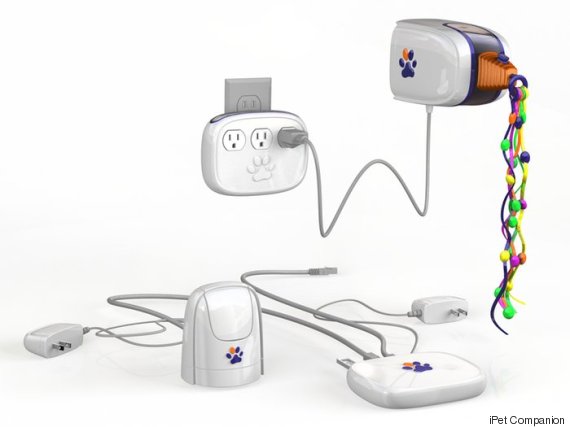Good news: It's about to be much easier to invite strangers into your home to play with your pets.
A Kickstarter launched Friday will allow interested parties to set up a camera and pet toys in their home for anyone to mess around with remotely. It's called the iPet Companion HomePlay, and it's the latest version of a piece of equipment that's been used for years in animal shelters to make sure cats get attention around the clock.
It's pretty simple -- basically, the iPet Companion is an Internet-connected camera and device that streams video online and allows basic commands from people watching. They can move the camera, look at your pet and press a button to wiggle a toy around.
In theory, you could use it for any animal, though it's been used mostly for cats so far.

The company behind the device is looking for $150,000 in funding. The first 50 people to donate $149 or more will get their own device, though the final product is expected to retail for about $229. There's also a $2.95 monthly fee, because iPet hosts the web service that allows you to stream video of your pet.
When the home version launches, you'll be able to stream to whoever you want -- or keep the video feed to yourself.
Apparently, demand is strong. The Kickstarter, which has over a month left, has already raised over $15,000. The shelter version proved so popular that Scott Harris, iPet Companion's founder, told The Huffington Post that thousands of people started asking for a home version.
"The reason people keep talking about this is this emotional connection they have from a thousand miles away. We had people from Greece call in and donate to the shelters that have the system [in the United States]," Harris said.
The shelter version has a pretty simple setup. They stream live video that any number of people can tune into at the same time. If you want, you can enter a queue to move the camera and play with the cats. Each room has toys that are hooked into Internet-connected devices, and you can move them by pressing a button.
It looks like this:

As you can see, there's sort of a problem: Cats get bored easily.
"It is true that for cats, toys quickly lose their novelty," Adi Hovav, a cat behavior expert who works with the American Society for the Prevention of Cruelty to Animals Adoption Center, told HuffPost via email.
"Adolescent cats will stay more engaged than an adult cat, but eventually even a teenage cat will get bored, too. Other than sort of waving back and forth, there's no real challenge in it for the cat," she continued.
To stop that from happening, Hovav said, you'd ideally limit access to the toys and change where they're located in the room -- which some shelters already do with the iPet Companion.
Harris understands this and said the home version is meant to be versatile.
"You can plug anything into that adapter. ... Toys that you can get on your own -- you can plug a laser pointer in," Harris said.
And that's where the iPet Companion really gets interesting. Harris explained to HuffPost that the device is actually sort of a trojan horse to bring the "Internet of things" to more homes. You don't really have to use it for pets. The adapter could be used for any device with an electrical plug -- a sprinkler, say, that you'd be able to activate remotely to water your lawn.
The idea of a connected outlet isn't really new. For example, companies like D-Link make WiFi-connected plugs that you can use to remotely turn devices on and off. Philips makes Internet-connected lightbulbs.
But Harris thinks pets could be the secret to getting this technology into more homes.
And down the line, Harris hopes similar technology could help do bigger things, as well: A doctor in New York could advise a surgeon elsewhere in the world by using a device to control a laser pointer, for example.
"Our whole goal, our whole purpose is to let anyone control any physical object that they want moved anywhere in the world," Harris said.
